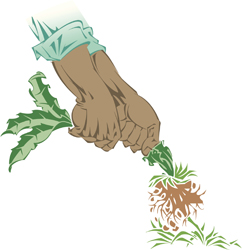Control of parasitic weeds
Parasites attach themselves to the vascular system of the host, linking the two species physically and physiologically so are difficult to control. The parasite's dependency on the host and its perfect coordination with host developmental signalling suggests that it should be susceptible to novel control strategies. However, until now the key processes involved in parasite–host interactions remain poorly understood. The EU-financed the 'Genomics-based investigations into orobanche-host interactions' (OROBANCHE) research project on the molecular biology of parasitic plant host invasion process in order to generate new approaches to their control. Specific objectives included the characterisation of Orobanchaceae gene expression and mRNA movement between hosts and parasitic weeds. In collaboration with several university partners from the United States, researchers created the first large-scale database of transcriptome data from three related parasite species. The existence of the sequence database enabled a number of novel research directions. Germination signals were among the first interesting genes discovered in the database. The parasites Orobanche and Striga only undergo seed germination after stimulation by specific chemical compounds secreted by host roots. Studies were initiated to characterise parasite ability to perceive these signals. The main class of germination stimulants are strigolactones, which are plant hormones that control plant architecture and function. The strigolactone gene transcripts encode functional proteins and are coordinately regulated during life stages of the parasites. One horizontal gene transfer event from a legume ancestor to Orobanche aegyptiaca is an intriguing case in plants. The transferred gene, an albumin 1 KNOTTIN-like protein gene, is related to anti-insecticidal proteins. Thus, its acquisition from a host may carry a fitness benefit. The gene appears to be expressed, and function and homologues were sequenced from several related species. In summary, the research project has contributed multiple new insights into the co-existence of parasitic plants and their hosts. It is expected that this work will contribute to the development of more effective parasitic weed control strategies.







